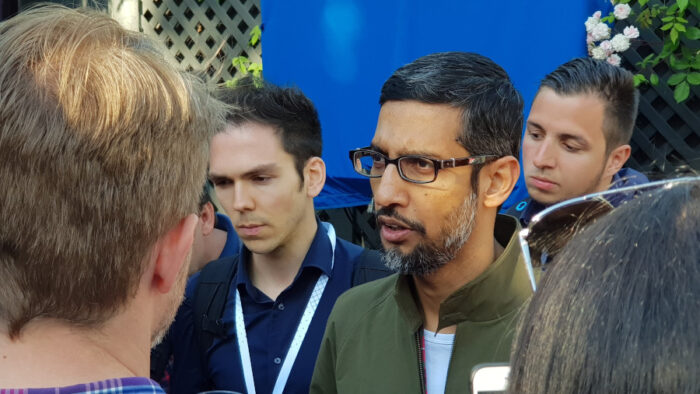ฟัง Sundar Pichai ไปออกรายการ Vergecast ในหลากหลายประเด็น (หนึ่งในนั้นคือปัญหาของ Pixel 4)
แต่ประเด็นที่สนใจเป็นส่วนตัวคือ คนระดับ Sundar Pichai ที่เป็น CEO ใหญ่ของ Alphabet มีพนักงานเป็นหลักแสน มีโครงการสารพัดเรื่อง มีดราม่าสารพัด ภาระหน้าที่แบบนี้ คนแบบเขาบริหารเวลาอย่างไร
So as CEO of Google, you’re obviously managing a giant company remotely. You’re dealing with governments. You’re dealing with your own employees. How are you currently just managing your time operating the company?
คำถามนี้อาจตอบยากหน่อยเพราะเป็นช่วง COVID-19 ที่ทำให้โฟกัสของ CEO ทั้งโลกเปลี่ยนไป แต่ก็ยังพอเห็นภาพรวมอยู่ว่าเขาทำอย่างไร
I’ve tried to have two parallel tracks. One is explicitly, there’s a definite focus on COVID response. So I’m spending a significant chunk of my time on something like that, which I wasn’t spending two months ago.
But also making sure the company operationally is focused on continuing to pursue all efforts they are doing and being able to compartmentalize, and do that, too.
หลักการบริหารเวลาของ Sundar คงไม่ต่างจากผู้บริหารใหญ่คนอื่นๆ คือ ต้องมีแผนล่วงหน้าว่าจะใช้เวลาอย่างไร กับเรื่องใหญ่ๆ ในแต่ละเรื่อง (เพราะเวลาเป็นทรัพยากรที่ทุกคนมีจำกัด ไม่ว่าเป็นผู้ยิ่งใหญ่แค่ไหน)
I have a clear sense of the major areas in the company I want to spend a percentage of my time [on].
สิ่งที่น่าสนใจคือ Sundar มีระบบรีวิวการใช้เวลาย้อนหลังทุกไตรมาส เพื่อประเมินว่าใช้เวลาอย่างถูกต้องเหมาะสมไหม อันนี้เป็นตัวอย่างที่ดีที่น่าทำตาม
I actually look back at my calendar every three months to see whether I spent my time on the things I wanted to spend. And I’ve always done that. So any aberrations that come out, I step back and think, “What can I do structurally to make sure I get back to how I want to spend my time?”
So it’s a constant reiterative process. And sometimes you look back in horror, and you realize you got it wrong, and then you course-correct.
Sundar ยังมีการบล็อคเวลาไว้ล่วงหน้า เพื่ออ่านเรื่องอื่นๆ (ที่ไม่ใช่เรื่องงาน) รวมถึงใช้เวลาคิดเรื่องต่างๆ ด้วย เทคนิคนี้ก็นิยมกันในสูตรการบริหารเวลา ว่าเราต้องบล็อคเวลาไว้ล่วงหน้าสำหรับ “สิ่งที่จำเป็นต้องทำ แต่ไม่เร่งด่วน” เพื่อให้มีเวลากับมันจริงๆ ไม่ใช่ไปทำตอนว่าง (ซึ่งเราจะไม่ว่างสักที)
คนที่มีชื่อเสียงในเรื่องนี้คือ Bill Gates ที่จะมี Reading Week หนึ่งสัปดาห์เต็ม ไปอยู่ในที่สงบๆ อ่านหนังสือที่ควรอ่านเพียงอย่างเดียว ไม่ทำงานอื่นเลย
I’m trying to force-block times on the calendar, specifically to read and think. I think it’s hard to do. But actually block the time and do that.
Sometimes just trying to understand what’s going on and spend time outside. So I think carving out that thinking time is one tool I have.
อีกประเด็นที่น่าสนใจคือ Sundar บอกว่าการ Work from Home ทำให้เขาเสียเวลาช่วง “เปลี่ยนสถานที่” (transitions) ที่เป็นเวลาว่างให้เขาคิดเรื่องต่างๆ แต่ในทางกลับกันก็ได้เวลามาทำสิ่งต่างๆ มากขึ้น
I miss transitions giving me a chance to drive and think about stuff and process. And so on hand, it’s a bit more efficient because you can move across what we are doing right now might have taken a lot more time, maybe not as a podcast.
But I miss the transition. I miss that space to think quietly. And so for me, that’s definitely something I need to progress better.
จากคำตอบของ Sundar และผู้ยิ่งใหญ่อื่นๆ ที่เคยอ่านมา คิดว่าสามารถสรุปได้ว่าเป็นเรื่อง discipline ล้วนๆ คือต้องมีวินัย มีสติกับตัวเองว่าใช้เวลาอย่างไร โดยใช้เทคนิคการวางแผนพื้นๆ (ที่เราใช้กับเรื่องอื่นๆ แต่มักไม่ใช้กับเรื่องเวลาของตัวเอง) นั่นคือ วางแผนล่วงหน้า และตรวจสอบย้อนหลัง
หมายเหตุ: ภาพประกอบเป็นภาพถ่าย Sundar Pichai ระยะประชิด ถ่ายเองกับมือตอนไปงาน Google I/O 2018

